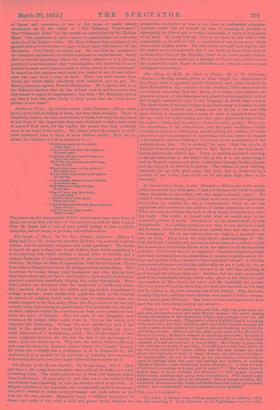The Curate of Slisre. By the Rev. Charles Anderson. (Henry
S. King and Co.)—Mr. Anderson describes his book "as a record of parish reform, with its attendant religions and social problems." His curate is one of the men, a class, one_ would believe, from which something is to be expected, who would combine a decent order of worship and a zealous discharge of functions, priestly, if not sacerdotal, with liberal doctrine. In Shyre he finds an appropriate field for his labours.- There is no order or beauty of ritual, no life in the parochial ministrations. How 11 strives for better things, what hindrances and what help he finds from those about him, all this is described in a vigorous, life-like fashion, personal experience manifestly helping the writer throughout. Pare- .ehial politics are discussed with the disaffected or indifferent towns- folk ; sanitary reform with the selfish and pig-headed proprietors of cottage property ; great intellectual questions, such as the bearing of science on religious belief, with the men of cultivation whom our -curate, happier so far than many whom fate drops down in the average eonntry town, finds among his parishioners. It is inevitable that the talk on these subjects should be, sometimes at least, more ponderous than befits the style of dialogue. That few men, in our judgment, have written as Sir Arthur Helps could write it. Yet, on the whole, it is vigorous and interesting. Perhaps the least satisfactory part of the book is the episode of the young lady who falls under the sacer- dotal influences of a Romanising priest. We always expect to find some congruity between the life and the fate of the personage of a story ; here we cannot see it. Why does she marry without affection, and separate from her husband, unless indeed the "Curate " himself, for whom she evidently has a preference, is to be blamed for it. Mr. Anderson is to be praised for his fortitude in resisting the temptation of marrying his hero, but poor Agnes Haswall has to suffer for it.


































 Previous page
Previous page